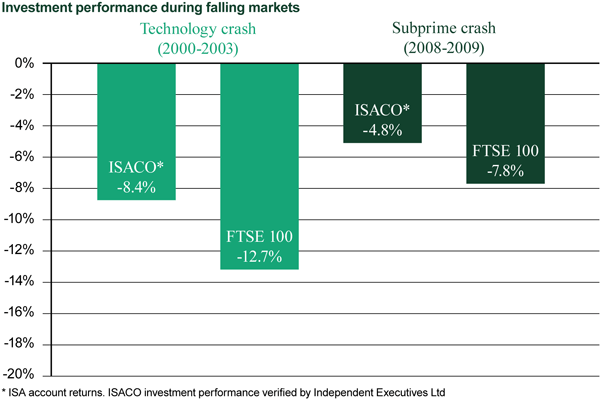 I’ve been investing in Stocks & Shares since 1997 and since 1998 I’ve always added the full years ISA allowance. I’m fortunate to be one of the few investors that have outperformed the FTSE 100 over the long-term*. In a recent three year period** I’ve made an average yearly gain of 17% compared to the FTSE 100’s 7.9%.
I’ve been investing in Stocks & Shares since 1997 and since 1998 I’ve always added the full years ISA allowance. I’m fortunate to be one of the few investors that have outperformed the FTSE 100 over the long-term*. In a recent three year period** I’ve made an average yearly gain of 17% compared to the FTSE 100’s 7.9%.
As an ISA and pension investor, my aim is to profit in rising markets and achieve portfolio protection in falling markets. The reason I do this is because my aim is to outperform the US technology index, the Nasdaq Composite, and the FTSE 100 over the long-term. I’m sure you’ll agree with me that outperforming the stock market is extremely difficult to achieve. However, beating the market does help you to achieve above average performance, allowing you to arrive at your financial goals faster. As an investor, I’m a trend follower and market timer and my aim is to get in sync with the markets trend and direction. Rather than swimming against a current, I prefer to swim with it.
*Source: Yahoo Finance: Cumulative return (Dec 31st 1997 - Dec 31st 2010) Stephen Sutherland 93.3%, FTSE 100 14.6%
**Source: Yahoo Finance: Average Annual return (Jan 2009 - Dec 2011) Stephen Sutherland 17%; FTSE 100 7.9%
ISACO investment performance verified by Independent Executives Ltd
A stock market cycle lasts approximately 5 years
A full economic cycle lasts about 5 years and consists of a bull market and bear market. A bull market is when the market forms an uptrend and a bear market is when the market forms a downtrend. Bull markets can be seen as the ‘boom’ part of the cycle and the bear market can be seen as the ‘bust’ part. My aim, and the aim of our clients, is to ride the wave of the bull market and stay fully invested. This is typically a two to four year period. During this time, we don’t move into cash. Instead we stay fully invested in high quality growth funds and sit patiently in our funds until the bull market has run its course.
When the bull market ends, a bear market begins. This is when our investment strategy changes from ‘profit’ to ‘portfolio protection.’ 75% of investment funds move in the same direction as the stock market and if the market is falling (bear market), most funds will drop irrelevant of their grade or manager status. This means investing against the market's trend is dangerous. Investing in funds, especially growth funds, during bear markets is high risk. In bear markets, to achieve portfolio protection the best place to be is cash.
Moving into cash during falling markets for portfolio protection
When a bear market takes hold we move into cash, as this gives full portfolio protection. To guarantee that our portfolios are safe from losing value we use a cash park. Switching from being invested in growth funds into a cash park is just like moving your portfolio out of the stock market and placing it into a bank. Bear markets are shorter in length than bull markets and tend to last 9-18 months. During this time we have to be patient and sit in cash until the bear market ends and a new bull market begins. This is when we move back into growth funds. Take a look at this table and it will show you how it works.

By moving temporarily into a cash park when the market is falling, it helps to preserve and protect your profits made in the bull market periods. You are probably aware that we’ve just recently been through one of the worst markets in history. Some of the main world stock market indexes lost over half their value. As you can see from this next image, in the two most recent bear markets, we’ve fortunately managed to outperform them both.

As you can see from the bar chart above, in the 2000-2002 technology crash, we dropped 8.4% per year compared to the FTSE 100’s 12.7% per year loss. In the subprime crash of 2008-2009, my account fell 4.8% per year compared to the FTSE 100’s 7.8% per year loss. These results tell you that we were fortunate ‘to beat’ the FTSE 100 in the two previous bear markets.
If you are an investor like me seeking long-term capital growth on your ISA and pension portfolio and we fail to beat the stock market over the long term, it is probably going to have a damaging effect on our retirement plans. When an investor fails to hit the annual growth targets required, instead of arriving at their goal on time, they arrive late.
This table highlights the dangers and shows what happens to your retirement plans if you underperform. In this example, we’ve used a person with a £250,000 portfolio whose aim is to grow it into a million pounds over the next ten years.

To be able to do that successfully, the person would have to grow their account at 15% per year, which we agree is no easy feat. However, it is possible when you have an edge. The compounding rule is when you get 15% annual growth your money doubles every five years. That means at 15% annual growth £250,000 turns into £500,000 in the first five years, and then the £500,000 turns into a £1million in the final five years.
However, if you fail to get adequate growth on your capital, it's going to take you much longer to reach your retirement goals. For example, if your adviser's fund choices result in you underperforming the market and you achieve just 7.5% annual growth, then it would take you twice as long to get to your goal. Instead of getting to your objective in ten years, it would take you twenty. And if your adviser only managed to help you achieve 3.75% annual growth, it would take you forty years to get to your goal. That’s thirty years late!
For some people, the risk of their adviser picking the wrong funds, resulting in gross underperformance, is too high. When an investor realises the dangers of underperformance and how it will have such a a negative effect on their financial future, their next step is normally to seek out help and guidance from an investment expert with a history of ‘beating the market. If that individual's adviser is one of the 80-90% who underperform the market, by staying with him or her, that person could be putting their family’s future welfare in danger. Bearing this in mind, I hope you can see why attaining market beating performance should always be your ultimate objective.
As always, if you have any questions or thoughts on the points I've covered, please leave a comment below or connect with us @ISACO_ on Twitter.
Please note past performance should not be used as a guide to future performance, which is not guaranteed. Investing in Funds should be considered a long-term investment. The value of the investment can go down as well as up and there is no guarantee that you will get back the amount you originally invested.
Find out where an expert invests
Are you an ISA or SIPP investor with over £100,000 actively invested? Are you looking for better returns but are unsure which funds to invest in? Our personal investment service allows you to buy the same funds as a star-performing investor. You find out where he invests, keep full control of your account, enjoy a close relationship with a trusted expert, and benefit from the potential for attractive long-term returns.
To find out where an expert invests >>













